Leviticus is one of the least read, most confusing books of the Bible for traditional Christians to understand, yet it is one of the most important books in the Bible. It lays the foundation for the gospel message, the cross of Yeshua/Jesus and reveals the pathway to Elohim in heaven. This book is full of life-changing gems, as this videos points out, and it shows the saint how to stay in the river of life and be blessed in his physical life.
Tag Archives: Leviticus
Leviticus Chapters 12 to 15—Natan’s Commentary Notes

Leviticus 12
Leviticus 12:2, Unclean.One may rightly ask why new life begins in tumah or spiritual impurity? Could this have anything to do with David’s statement in Psalms 51:5, “Behold, I was shaped in iniquity; and in sin did my mother conceive me.” The basic premise of all the false religions and humanistic philosophies of the world is that man is innately good and that any evil attributes he may possess are largely due to his evil environment. Do you believe this? Or have you taken responsibility or ownership of your own sin and the sin nature in you?
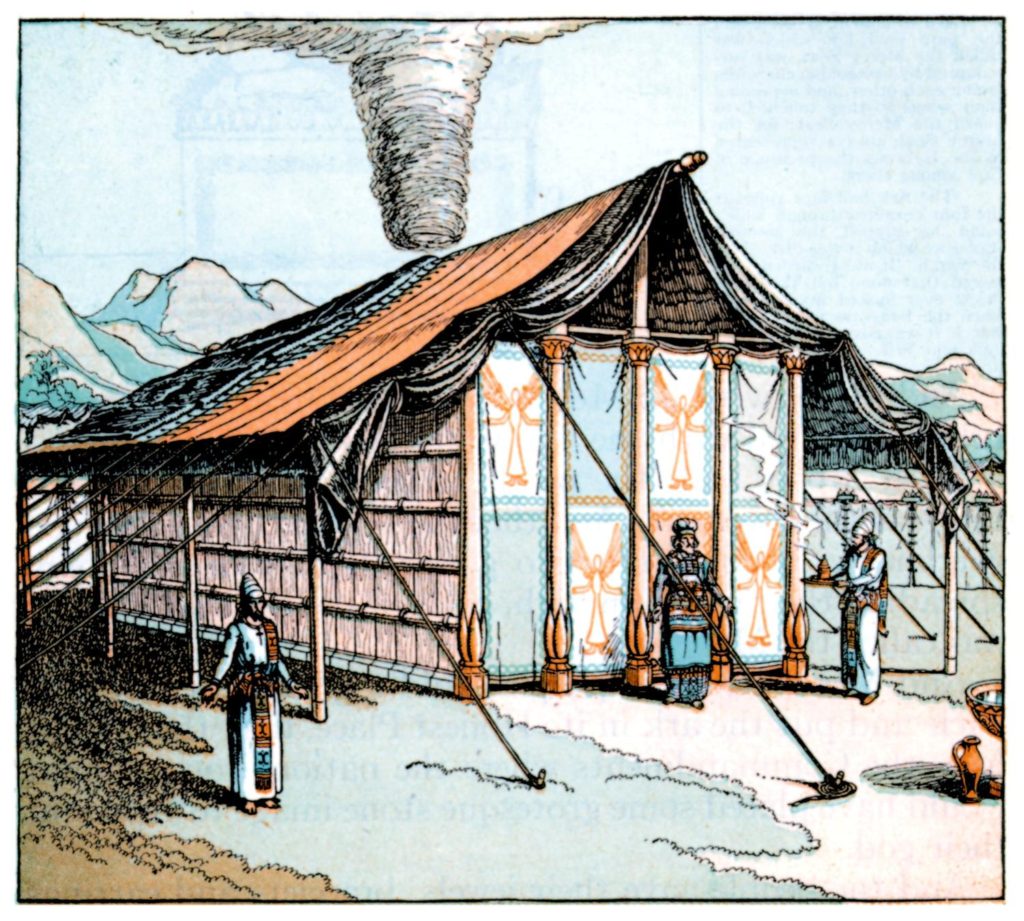
Leviticus 12:4, Come into the sanctuary/miqdash. The miqdash referred to the tabernacle or temple and denotes that which has been devoted to the sphere of the sacred. An area was sacred since it was the place where YHVH dwelt among his people (Exod 25:8) and it was not to be profaned (Lev 12:4; 19:30; 20:3; 21:12, 23; q.v. The TWOT). The command that a woman was forbidden from entering the sanctuary when in an impure state begs this question: When then could a woman enter the tabernacle? The ArtScroll Vayikra/Leviticus Commentary doesn’t answer this question nor do Rashi or Hirsch in their commentaries. Keil and Delitzsch suggest that she would have come into the sanctuary to partake of sacrificial meals (e.g. the peach or fellowship offerings (Lev 3:1–17; 7:11–21) although the Torah doesn’t specifically state this. Lev 7:20–21 does state that anyone eating this offering in a ritually impure state would be cut off from Israel, thus implying that this meal might have been eaten within the confines of the tabernacle or temple sanctuary—or at least the outer courtyard where the altar of sacrifice was located. But do we know this for sure? No. For example, in 1 Samuel chapter one, we read that Hannah, after offering her sacrifice, prayed outside the door of the tabernacle where she met Eli the high priest (1 Sam 1:9). Later, in the history of the Jerusalem temple, the Woman’s Court was constructed. This separate court for women, located just outside of the temple itself, was where women prayed and offered their sacrifices, and was, according to Jewish tradition, constructed in the time of King Jehosophat (2 Chron 20:5; Carta’s Illustrated Encyclopedia of the Temple in Jerusalem, p. 93, by Airel and Richman). Also according to Jewish tradition, women were allowed to go past the Women’s Court and enter the temple sanctuary itself to offer up sacrifices although no scriptures are given to support this assertion (ibid.)
Leviticus 12:5, Two weeks. One may also ask why a woman remains in a state of ritual impurity only seven days for a male child and two weeks for a female child? To some of our minds that may have been “leavened” by the “women’s rights” agenda of the 1960s, this may seem sexist. One thing is certain, YHVH is not a respecter of persons. He does not value one gender above the other. Both male and female were made in his image (Gen 1:27). Therefore, Elohim is both male and female. For Elohim to view women as inferior, he would be showing favoritism to one part of himself over another, and this is not possible.
One explanation the Jewish sages give for the eight-day compared to the 14-day period of ritual impurity is that a male child has to be circumcised on the eighth day. A brit m’lah is to be a joyous occasion. If a woman were still in a state of ritual impurity she would not be able to participate in her son’s circumcision (The ArtScroll Tanach Series Vayikra, p. 187).

Leviticus 12:6, She shall bring. Why did the new mother have to bring a sin offering for her newborn child—after all isn’t childbirth a glorious and joyous event? To answer this question we will ask a question. What was one of the curses Elohim placed on Eve for her part in bringing sin into the world? (Gen 3:16) Labor pains were decreed upon woman for punishment for her part in original sin. The Jewish sages teach that the sin offering Torah demands her to give after giving birth is to atone for that. As believers in Yeshua, we might rather see this offering as pointing to ancient Israel’s need for atonement from sin in the Person of Yeshua the Messiah, who was yet to come. Does this not underscore the seriousness YHVH places on sin and that all have sinned and fallen short of his glory (Rom 3:33), and that we are all in desperate need of a Redeemer who would deliver us from that “certificate of sin debt that was against us” and nail it to his cross (Col 2:14)?
Leviticus 13
Leviticus 13:2, Leprous sore [Heb. tsaraath]. This was an infectious skin disease and not necessarily leprosy.
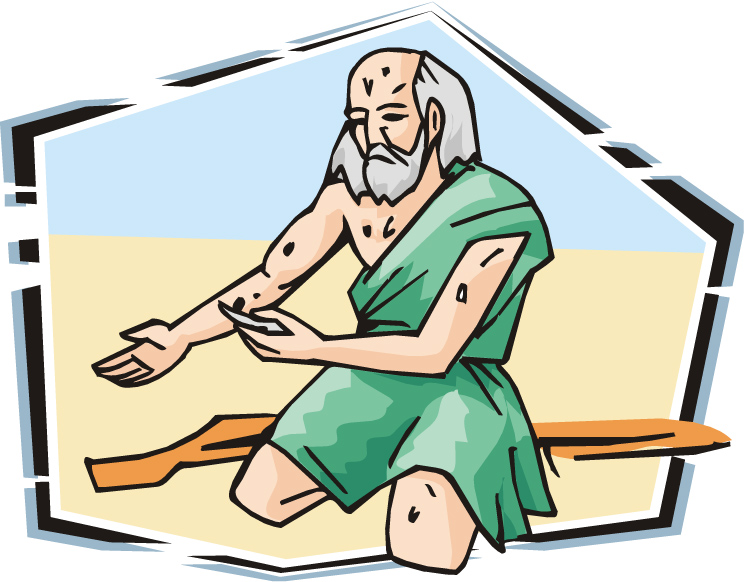
Leviticus 12 to 15—Natan’s Commentary Notes on Some Disgusting Subjects

Leviticus 12–15
Leviticus chapters 12 through 15 are some of the most distasteful and difficult to explain in the whole Bible, much less to relate to and to apply to our lives. After all, who wants to talk about diseases, disgusting molds and mildews, and bodily discharges? And who can relate to leprosy? Yuk!
Yet the Torah contains these subjects for a reason. Yes, sanitation, cleanliness and our physical good health is important to our Creator for obvious reasons, but lurking behind this distasteful and, at times, even revulsive subject is a much deeper issue: the disease of sin. When we view sin in terms of a contagious spiritual disease, suddenly we gain a new and deeper understanding of its destructive nature.
Even though the old adage, “Cleanliness is next to godliness” is not in the Bible, it is a biblical truism. Our cleanliness at all levels, body, soul (mind, will and emotions) and spirit are vital to a right relationship with Elohim. He is holy or set-apart (i.e. from the pollution, filth and defilement of this world), and without holiness, no one can see Elohim (Heb 12:14). In essence, holiness is nothing more than spiritual cleanliness. This is the deeper meaning behind Leviticus chapters 12 through 15.
Overview of Parshiot Tazria-Metzora (Lev 12–13 and 14–15)
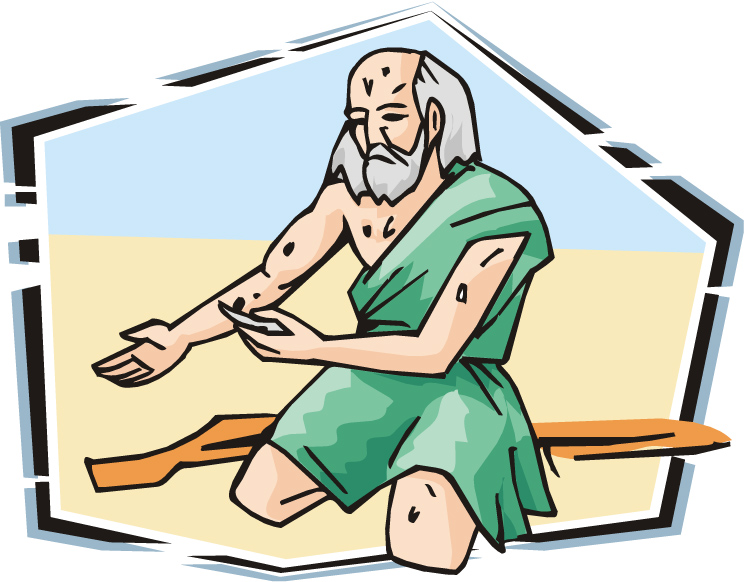
Often these two parshiot (the plural of parashah meaning “Torah portion” in Hebrew) are combined in the yearly Torah reading cycle depending on how the biblical calendar falls for the year. Their combining is likely due to the fact that each is relatively short and deals with related subjects: namely, the ritual purity laws.
As we shall see, the causes of ritual impurity involve sin issues. As a remedy to this problem, the Torah prescribes procedures that the afflicted person had to follow in order to be deemed cleansed and thus be readmitted into the camp of Israel after having been temporarily expelled because of ritual impurity. All the ritual cleansing laws prophetically pointed to Yeshua’s atoning death on the cross.
These two parshiot dealing with diseased and unclean persons immediately come after the laws concerning clean and unclean meats (Lev 11). What the Israelites ate as well as the state of their physical bodies was an important aspect of holiness in the eyes of YHVH.
From these two parshiot, we learn that an unclean person could only become clean through the atoning blood of a sacrificed animal or through ritual cleansing of water by which he was reconciled to Elohim and brought back into the camp of Israel.
What can we learn from the juxtapositioning of these subjects (i.e. the laws pertaining to unclean meats and unclean people) in the Torah? Simply this. Man can easily become impure and defiled because of his innately depraved, crooked, and wicked heart that is at enmity with the laws of Elohim (Jer 17:9; Rom 8:7).
Since the fall of Adam, man has been in a state of impurity from Elohim. Thus, sin separates him from the presence of Elohim and from his fellow Israelites. Only the sin-atoning blood of Yeshua can bring the sinner to a place of purity where he can be reconciled to the Kadosh (Holy) One of Israel, and become part of the camp (i.e. the congregation of the saints or kadosh ones) of YHVH.
Leviticus 12:1–8 deals with the purification of women after childbirth. Adam Clarke in his commentary states that when a woman has to bring a sacrifice after the birth of her child, Elohim maintained the remembrance of the fact that through woman sin entered the world. He also required the memorial of a sacrifice to show that the state of a sinner, howsoever deplorable, is not hopeless. In every ceremony, we may see both the justice and the mercy of Elohim. Hence, while we have the knowledge of our spiritual impurity, we have also the knowledge of our cure—the sacrifice of an innocent animal, which always points to Yeshua who once and for all, in his sacrificial death, cleansed us from sin’s impurity.
Leviticus 13–14 deals with the disease of tzara. The noun tzaarath means “disease” or “skin disease” and is from the root tzara meaning “to be stricken, strike down, to smite heavily.” This is another disease that pictures the ravages of sin.
It was up to the priests to diligently inspect each diseased person—based on YHVH’s instructions and criteria—to determine whether one was unclean or not, and whether one was fit to remain in the camp of Israel. The priests were not to be hasty in their judgments, but were to make determinations based on diligent inquiry and to follow the exact protocols as outlined in the Torah. This teaches us that YHVH is exacting as to how sinners can be cleansed spiritually from sin and thus become part of the spiritual camp of the righteous redeemed. The Torah is the standard of righteousness that will judge all men. It also defines sin (1 John 3:4), and will determine one’s rewards in YHVH’s eternal kingdom (Matt 5:19).
Today, from time to time, those involved in gross sin must be put out of the congregation of the righteous. This is the duty of the leaders who must inspect individuals and make righteous decisions. Yeshua discusses this in Matthew 18:15–19 where he instructs leaders on how to deal with sin in the camp.
Continue readingLeviticus Chapter 9—Natan’s Commentary Notes

Leviticus 9:1, 9, 15, 18, Take for yourself…sons of Aaron…the people’s offering. Redemption (along with obedience to YHVH’s commands leading to righteousness and holiness) starts with the individual (in this case, Aaron the high priest)—especially the head or priest of the home (i.e. the husband or father) and then ripples out to the immediate family (“the sons of Aaron”) and then spreads to those around us (“the people”).
Leviticus 9:2–4, YHVH will appear. It is impossible to appear before YHVH Elohim without the shedding of innocent blood for the atonement of man’s sins. Man is too sinful and unholy to be able to come before his perfect and holy Creator. The sooner human’s realize their sinfulness and unworthiness, and the need to deal with the sorry state their live is in, the sooner they will be able to fill their inner (some say the “God-shaped) void and the unmet need of having an intimate relationship with their Creator.
Leviticus 9:6, This is the thing. When atonement for sin is made, and a person comes to their Creator on that basis, YHVH and his glory will appear in one way or another in that person’s life.
Leviticus 9:6, 23, The glory [kobowd] of YHVH. Kobowd means “glory, honour, glorious, abundance, riches, splendour, dignity, reputation, reverence.” The root word of kobowd is the verb kabad or kabed meaning “to be heavy, be weighty, be grievous, be hard, be rich, be honourable, be glorious, be burdensome and be honoured.” According to The TWOT, the literal meaning of kabad/kabed is rarely used in Scripture; rather, its figurative meaning (e.g. to be heavy with sin) is more commonly used. As such, in Scripture it often refers to a weighty, impressive or prominent person in society who is worthy of honor and respect.
Derivatives of kabed include kabed meaning “great,” kabed meaning “liver,” kobed meaning “great,” kabod meaning “glorious” (Ps 45:14; Exek 43:41), kabod meaning “glory,” k’budda meaning “abundance, riches” (Judg 18:21) and k’bedut meaning “heaviness” (Exod 14:24).
In Lev 9:6 and 23, kabod is a noun referring to glory, glorious, honor or honorable and is often used combination with another noun as a noun-adjective (e.g. the glorious king).
Leviticus 9:7, Go to the altar…sin offering…make atonement. For the glory of YHVH to appear in one’s life, one must first go to the altar of the cross, and must do two things: lay one’s life down as an offering or living sacrifice (i.e. die to one’s carnal sin nature) before YHVH, and then receive Yeshua as an atoning sin offering in payment for one’s sins.
Leviticus 9:12, Sprinkled all around. (Other references to sprinkling of the blood include Exod 24:6; 24:8; Lev 6:27; 8:11; 8:19, 24, 30; 9:12, 18.) This is a prophetic picture of Yeshua’s shedding or sprinkling his blood on the cross. The apostolic writers use the term sprinkling on several occasions to describe what happened on the cross for the atonement of sin (1 Pet 1:2; Heb 9:13–14; 10:22; 12:24).
Leviticus 9:22–23, Aaron lifted his hand…blessed the people…the glory of YHVH…fell on their faces. The acceptance of and the blessings from heaven flow down to us when what we are doing lines up with heaven’s word and will. Aaron lifting his arms up and blessing the people pictures the river of life flowing from heaven through him and onto all the people. This river of life occurred because Aaron had followed the instructions Moses had received from YHVH (i.e. the Torah), then he cleansed himself of sin (v. 1), then the spiritual renewal and the river of life and redemption flowed to his immediate family (v. 9), then outward to the people around him (vv. 15 and 18). This done, the people were blessed and “the glory of YHVH appeared to all the people” (v. 23), and their sin offering was accepted as in heaven and earth came into agreement with each other resulting in the people worshipping Elohim (v. 24).
Leviticus 9:24 and 10:1,Fire from heaven versus profane fire. Fire is a biblical metaphor for spiritual light and truth. Divinely revealed Truth originates only from heaven. Man, because of his fallen, sinful condition, is incapable of originating Truth. Whatever religion, philosophy or ideology man invents out of his own carnal mind will, at best, be a mixture of Truth and error. This mixture is the result of humans feeding from the tree of the knowledge of good and evil, and listening to the fork-tongued two-pathed serpent (i.e. of good and evil or talking out of both sides of his mouth at once), who is lurking in that tree waiting to subvert and deceive man into joining his sinful rebellion against the Almighty Creator. That is why walking away from YHVH’s the divinely revealed (Torah) instructions—the spiritual light and fire of YHVH, is so perilous. This is what Nadab and Abihu did when they offered up strange fire to Elohim; they followed the inclinations of their sinful and fallen natures instead of walking in the light of YHVH’s truth by following his instructions. Playing with fire is a double-edged sword; fire both enlighten, energizes and purifies, but is also a symbol of divine judgement in that it destroys and consumes the carnal and often sinful works (the wood, hay and stubble, 1 Cor 3:12–15) of rebellious and prideful man.
Leviticus Chapter Seven—Natan’s Commentary Notes

Leviticus 7:6, Every male…may eat it.
The Torah Origins of the Communion Ritual and the Priesthood of All Believers
Why were the priests allowed to eat some of the offerings? What’s this all about? Let’s answer this question with a question. Why do believers in Yeshua eat the communion elements, and what do they represent? Is there a connection between the Levitical priests eating of the sacrifice and the saints eating the communion elements? Now let’s explore this idea.
In Leviticus 6:26 and 29, only the male priests were allowed to eat of the sin offering. Likewise, YHVH commanded the male priests to eat the baked unleavened bread of the minchah offering (Lev 6:16, 18). Yeshua himself not only continued this Levitical practice, but expanded and elevated it to a higher level at his last supper.
When Yeshua initiated communion among his disciples, what in essence was he saying? Simply this. His disciples were all now his holy or set-apart priests. This is the origination of the concept of the priesthood of all believers, or the royal priesthood as Peter terms it (1 Pet 2:9), or a kingdom of priests John calls it who will rule with King Yeshua in his millennial kingdom (Rev 1:6; 5:10; 20:6).
It was YHVH’s desire that the children of Israel would become such a priesthood even before he called the Levites to be his set-apart priests (Exod 19:6). However, they failed in this mission when they chose to worship the golden calf instead of YHVH (Exod 32). At that time, YHVH chose the faithful Levites to be his priests instead of the firstborn male leaders from all the tribes of Israel (Exod 32:26, 29; Num 3:11–13, 44).
Moreover, Isaiah prophesied about the priesthood of all believers—a priesthood that would extend beyond the confines of the Aaronic priesthood (Isa 66:21 cp. Dan 7:18). This higher level priesthood would extend beyond the patriarchal male leaders, who were the original priests in Israel (Exod 19:22, 24), to include all the Israelites, both male and female (Exod 19:6), as well as Gentiles who have been grafted into Israel through Yeshua the Messiah (Gal 3:28–29; Eph 2:11–19; Rom 11:11–32), which Paul refers to as the Israel of Elohim (Gal 6:16).
Being a kingdom of priests who will teach the inhabitants of planet earth the ways of Elohim is the role and destiny of all the modern day saints of Elohim who have been washed of their sins (i.e. Torahlessness, 1 John 3:4) in the blood of Yeshua (Rev 1:6), for they will reign with Yeshua on this earth (Rev 5:10) for a thousand years as Elohim’s resurrected and glorified adopted sons and daughters (Rev 20:6; John 1:12 cp. Rom 8:14–15, 23; 9:4; 2 Cor 6:18; Gal 4:5–6; Eph 1:5; 1 Jhn 3:1–2; Rev 21:7).
So saints of the YHVH Elohim, encourage yourself with these immutable promises from the Word of Elohim! Are you presently preparing yourselves now for auspicious and lofty role?
Leviticus 7:13, Leavened bread. The Torah prohibited the offering of leavened bread on the altar (Lev 2:11). There are only two instances where leavening in bread was permitted in the tabernacle service. In this verse, leavened bread was offered in conjunction with the peace offering (Lev 2:13), where it was eaten as part of the sacrificial meal. This was not a sin offering, but the peace offering. Therefore the bread of this offering didn’t represent the body of Yeshua. It was merely part of the fellowship meal representing a peaceful and loving relationship between the offerer and the Creator, and was similar to a family picnic, dinner or barbecue. But it wasn’t placed on the altar, nor was it a part of the sacrifice, therefore, it wasn’t a prophetic picture of the sinless Yeshua dying on the cross.
The second instance of leavened bread being offered in a tabernacle service occurred when the Torah instructs the priests to wave two loaves of leavened bread on Shavuot or Pentecost before YHVH (Lev 23:17). These two loaves prophetic and symbolic metaphors for the two houses of Israel (the northern kingdom and southern kingdom)—a spiritual picture of Jews and Christians. In this ceremony, the gracious and merciful Creator was demonstrating his acceptance of his people despite their sin.
Leviticus 7:23, Not eat any fat. All the organ fat of the ox, sheep and goats was used as part of the sacrificial service (Lev 7:30–31).The organ fat was given to YHVH as part of the burnt offering (Lev 1:3), the peace offering (Lev 3:3–4), the sin offering (Lev 4:8–10, 19). Fat is the Hebrew word cheleb/CKJ meaning “fat of humans or animals” or metaphorically, “the choicest, best part, or abundance of the land.” Therefore, the fat as one of the choicest parts of the animal was reserved for sacrifice to YHVH on the altar. But not eating fat, the Israelites in their minds preserved a reverence for YHVH’s altar upon which the fat or the best part was offered to YHVH. To eat the fat was to show irreverence for that best part that belonged to Elohim, which is why the offender was cut off from the nation of Israel. As living sacrifices who have been redeemed or bought with the blood of Yeshua, are we giving YHVH the best part of our lives? After all, he so loved us that he gave us Yeshua, which was the best he had to offer.
Leviticus 7:26, Not eat any blood.
The Supreme Significance of Blood
YHVH revealed in the Torah that the life of flesh is in the blood (Lev 17:11). Therefore, the blood symbolizes the whole life of the living being. This is why the blood being poured upon the altar made atonement for the souls of men (Lev 17:11–12), since it represented and pointed to the shedding of Yeshua’s blood when he sacrificed his life on the cross in atoning for men’s sins. Respecting the blood is necessary not only because it symbolizes the sanctity of the life of man who was made in the Creator’s image (Gen 1:26 cp. 9:6), but more importantly, because of the blood of Elohim’s Son that was shed for man’s redemption (Lev 17:11). For one to eat the blood showed disdain for what the blood typifies. In times past, this was so important to YHVH that a violation of this prohibition resulted in banishment from the nation of Israel.
The blood was to be reserved for the sacrificial service, where it was used symbolically to represent Yeshua’s shedding his blood on the cross. The blood of a lamb was put on the door posts to protect men from YHVH’s judgment against sin (Exod 12:7, 13). Moses sprinkled the blood of oxen on the people symbolizing their coming into covenantal relationship with YHVH (Exod 24:5–8). Additionally, the blood of sacrificed animals was sprinkled throughout the tabernacle, on Aaron and his sons, and all around the altar to sanctify it. All these acts and uses of the blood were illustrative of the unrestricted cleansing power of the blood of Yeshua (Rev 1:5; 7:14; 12:11; 1 Pet 1:2, 19; Heb 9:12; 10:19–22; 12:24; 1 John 1:7; Matt 26:28), which is why YHVH expected his people to treat the blood with a reverence. Those who didn’t evidenced a heart of indifference for the set-apart or kadosh things of Elohim—an intolerable offence in the Creator’s eyes.
On the dark and satanic side, the blood of humans and animals is profaned through demonic rituals involving drinking it and even cannibalism. This is an abominable perversion of holy communion and was an aspect of ancient heathen religions (Ps 16:4; Ezek 39:17, 19 cp. Num 13:32), and is a practice in which the end time antichrist heathens of the Babylonian whore system will engage (Rev 17:6; 18:13, 24).
General Overview of the Book of Numbers (B’midbar)
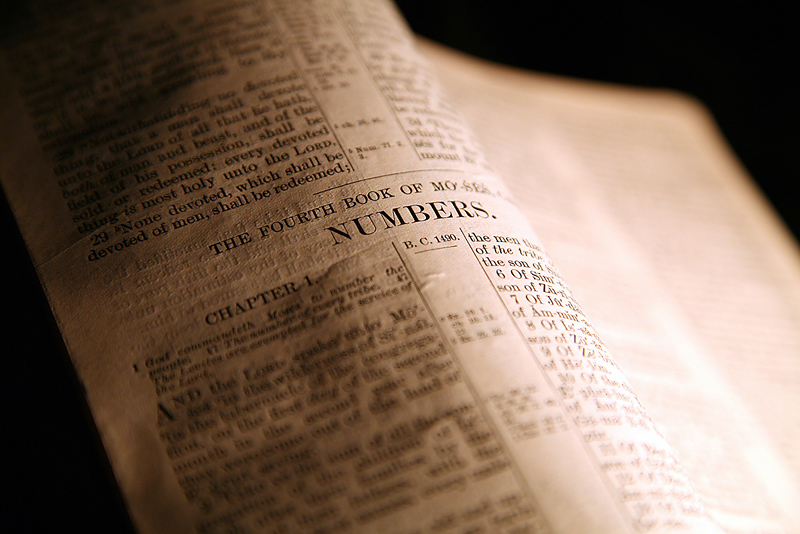
The English name Numbers derives from the fact that in this book the Israelites are counted or numbered on several occasions (see chapters 1, 2, 3, 4, 26). Leviticus ends with YHVH instructing his people to count their flocks for tithe purposes, while Numbers begins with YHVH, as the ultimate Good Shepherd (or in Hebrews, YHVH Rohee), counting the Israelites themselves, who are the sheep of his pasture (Pss 74:1; 79:13; 95:7; 100:3). The fact that this counting took place in the wilderness proves that it was not for political or national economic reasons, but was in fulfillment of YHVH’s Torah instructions. Each Israelite was to give a half-shekel of silver toward the maintenance of the tabernacle. The shekels then counted would give the exact number of Israelites (Exod 30:12–16).
The Hebrew name B’midbar meaning “in the wilderness” originates from the fact that this book chronicles Israel’s wandering in the wilderness. The book of Exodus, on the other hand, records the deliverance of Israel from Egypt, its establishment as a nation, its covenantal relationship with YHVH and the construction of the tabernacle (mishkan), which was the symbol of YHVH dwelling or tabernacling in the midst of his chosen people. The Book of Leviticus deals with the inner workings of that tabernacle and the mechanics of how sinful man could maintain a right spiritual relationship with a righteous Elohim. This was accomplished through the agency of the Levitical priesthood that would function within the tabernacle as a human intermediary between man and his Creator.
The book of Numbers covers much of Israel’s forty years wandering in the wilderness and recounts the early years of this nation under YHVH’s theocratic rule. Recorded are Israel’s triumphs and defeats, its obedience and disobedience to YHVH’s rule of law and the resulting consequences whether blessing or curses.
In this book, we see several main subdivisions. Chapters 1:1–10:10 cover instructions from YHVH to Israel while still at Mount Sinai. Chapters 10:11–36:13 cover the Israelite’s actual wilderness journey. The second section dealing with the wilderness journey has two main parts: the perishing in the wilderness of the older generation (Num 10:11–25:18), and the preparation of the second generation of Israelites to enter the Promised Land (chapters 26–36).
Reoccurring themes in the book of Numbers include the continual murmuring of Israelites and the divine punishment on them as a result. YHVH made promises to care for them and lead them into the Promised Land. Instead of having faith and trust in him, with few exceptions, the Israelites exhibited doubt and unbelief in YHVH. As a result, the entire older generation, with the exception of faithful Joshua and Caleb, perished in the wilderness never to realize the promises YHVH had made to them concerning the Promised Land. This is a poignant lesson for all believers in their faith walk. The spiritual application of this lesson is not missed by the writer of the Epistle to the Hebrews in chapter four of that book. When YHVH makes promises, his people need to embrace those promises with enthusiastic and optimistic faith and never let them go. After all, if we cannot trust our Creator, then who or what can we trust?
In this book, we see revealed the grace of YHVH, that he is longsuffering and slow to anger (Num 14:20–38), but that he is also just, and as a father, he disciplines those he loves. His judgments are measured and progressive. The more his children refuse to obey him and resist him, the stronger the judgments. Eventually, the older generation of Israelites died off in the wilderness. This teaches us that death is the final judgment against the sin of rebellion and unbelief. There are no eternal rewards or spiritual inheritance for those who refuse to take hold of YHVH’s promises and to go forward in faith and faithful obedience to him.
We see the work and person of the future Yeshua the Messiah in the book of Numbers as well. As Provider, he meets all of Israel’s needs both physical and spiritual. Paul reveals that Yeshua was the spiritual Rock that gave them water in the wilderness (1 Cor 10:4). Twice, Israel received water from the rock (Exod 17:1–7 and Num 20:1–13). Additionally, the secular prophet, Balaam, prophesied about the Messiah who was to rise out of Israel like a star (Num 24:17). Leading rabbinic Jews sages, such as Akiva ben Joseph of the early modern era, mistakenly applied this verse to the Jewish zealot, Bar Kokhba, when he endeavored to throw off the yoke of Roman rule over the Jewish people during the Second Jewish Revolt of A.D. 133–135.
Dealing with the viral pandemic of the disease of sin (part 2)
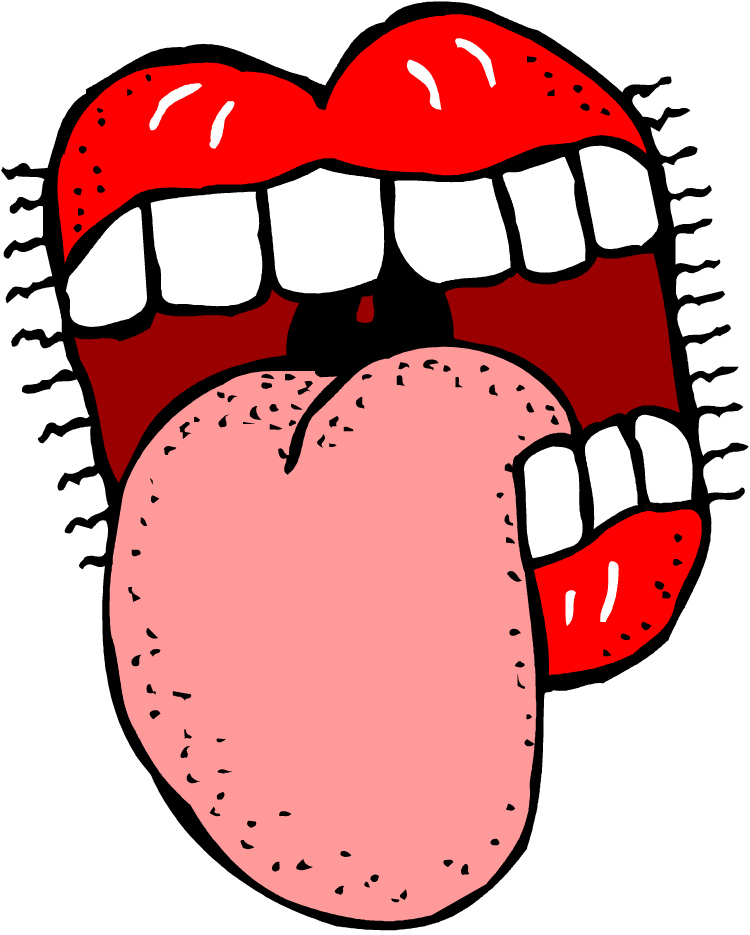
Leviticus 12–13 Explained
These chapters are perhaps some of the most difficult of the Torah for modern people to understand much less to ascertain the relevance of, so often we pass over them without much thought. However, when we view them from a more drash or allegorical level of biblical interpretation, suddenly they take on a whole new meaning and are packed full of deep revelations pertaining to our perennial internal struggle against sin as well as with sin in the world around us we explain in the discussion below. Sin is not a popular subject to discuss, but if we are to rise to the spiritual level for which Elohim created us—to be in some sense like him (1 John 3:1-3).
The Hebrew Terms Relating to This Passage Defined
- Tzaraas: a skin disease (improperly translated as “leprosy” in some Bibles). This Hebrew word means “to be struck with leprosy” (BDB) or “to smite heavily, to strike, or scourged of Elohim” since the leprosy was viewed as a special divine infliction (Wilson’s Old Testament Word Studies, pp. 248–249) against such sins as jealousy (cf. Miriam, anger, lack of full compliance with Elohim’s commands (cf. King Uzziah), and covetousness (cf. TWOT, p. 777).
- Niddah: this refers to someone who is separated or menstruous.
- Tumah: this refers to spiritual impurity.
- Metzora: one with a skin disease; Metzora is a contraction of the Hebrew word motzi and ra meaning “one who speaks slander.”
The Issues Explained
Leviticus chapters 12 and 13 deal with the subject of human contamination and delineates what could seem to be a lot of irrelevant and archaic, if not arcane, regulations relating to childbirth and skin diseases. Why is YHVH so concerned about “human contamination”? What is the larger picture here to help us gain understanding into the Father’s intent and heart behind these Torah-laws? The Jewish sages teach that man must not forget that even the gnats and earthworms preceded him in the creation. This is to teach man humility. But conversely, each stage of Elohim’s creation added something to that which had been created previously and that man was the final, crowning touch that would pull all the creation together to fulfill its purpose of spirituality in the performance of Elohim’s will. Man is therefore the last of the creatures to be created, but the first in significance because he is the purpose of it all and that if man is not worthy of his calling, then he has added nothing of substance to YHVH’s handiwork (The ArtScroll Tanach Series Vayikra, p. 184).
All this is to say that YHVH has a plan to redeem man from his sinful or depraved (animalistic) state. Man can choose to be elevated to this higher spiritual plane or to remain in a state no better than that of a gnat or a worm having added nothing to the creation’s spiritual betterment.
Continue reading
